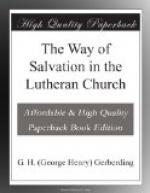When part of our country was in rebellion, the government sent deputies to those who had renounced their allegiance, empowered to confer pardon, and reinstate as citizens, all who accepted the government’s terms of pardon. These agents had no power in themselves, but they were authorized to carry the pardoning power of the government, and to those who accepted it from them, it was as valid as though each one had received a special proclamation of pardon from the government. Just so does the pastor, as Christ’s ambassador, offer and bestow Christ’s forgiveness to the penitent and believing sinner. He offers this pardon only on the terms laid down by Christ. The means through which he conveys this pardon is God’s Word. This Word, preaching repentance and remission of sins, when spoken by the minister, is just as effective as when it fell from the lips of Christ or His inspired apostles. Whenever he preaches God’s Word he does nothing else than declare Christ’s absolution. It is the Word of God, that still remits and retains, that binds and looses.
The pastor can only declare that Word, but the Word itself does effectually work forgiveness to him that rightly receives it. Not only can the minister carry this Word of God, this key of the kingdom, this power of God unto salvation, and apply it, but any disciple of Christ can do so. Dr. Krauth beautifully says: “The whole pastoral work is indeed but an extension of the Lutheran idea of Confession and Absolution.” And Dr. Walther says: “The whole Gospel is nothing but a proclamation of the forgiveness of sins, or a publication of the same Word to all men on earth, which God Himself confirms in heaven.” Dr. Seiss somewhere says: “Every time a believer in Christ sits down beside a troubled and penitent one, and speaks to such an one Christ’s precious promises and assurances of forgiveness, he carries out the Lutheran or scriptural idea of absolution.”
And even the minister of another denomination, above referred to, acknowledged to the writer, that when he found one of his parishioners of whom he was convinced that she was a true penitent, despondent on account of her sins, he unhesitatingly said to her, “Your sins are forgiven by Christ.”
We had intended to still say something about the public confession of Israel at Mizpeh, 1 Sam. v. 6, and of the multitudes who went out to John the Baptist, Matt. viii. 6; also of the private Confession and Absolution of David and Nathan, 2 Sam. xii. 13. But each one can examine these cases for himself. Enough has been said to assure us that our Church, in this matter also, is grounded on the eternal Word of God, and that she did wisely when, after repudiating the blasphemous practices of the Romish confessional, she yet retained an evangelical Confession and Absolution.




